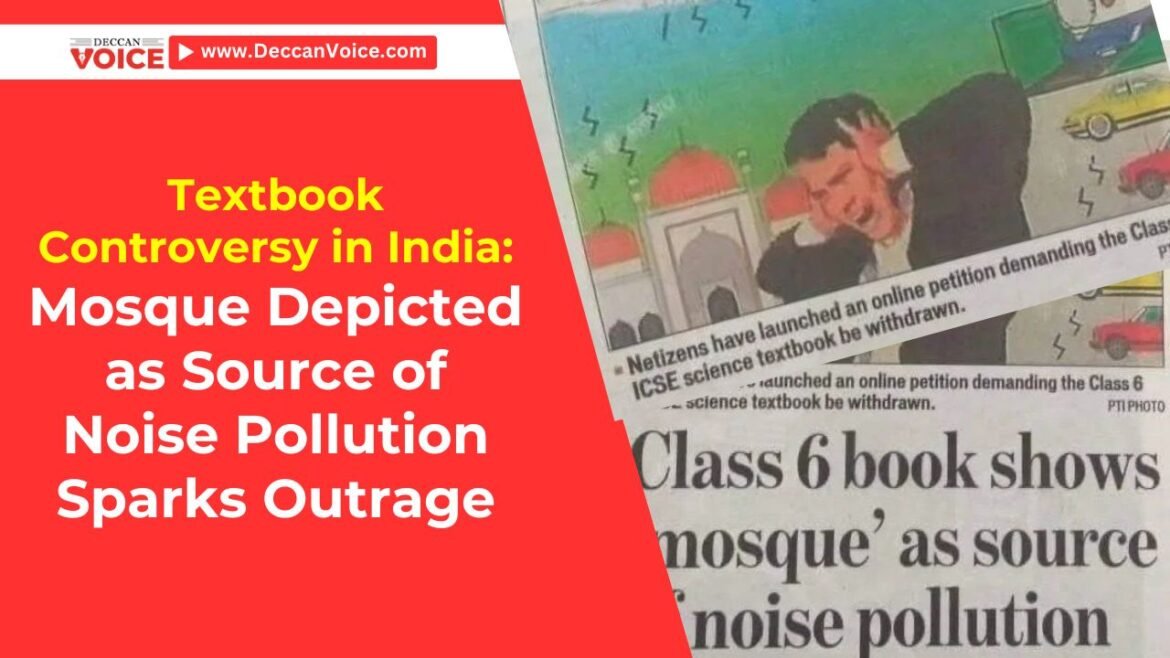Table of Contents
A significant controversy has emerged in India over a Class 6 ICSE science textbook. The book, published by Selina Publishers, features an illustration that appears to show a mosque as a source of noise pollution. This depiction has caused widespread anger, with many calling it Islamophobic and harmful, especially for young students.
The Controversial Illustration
The problematic image in the science textbook shows a man holding his ears, seemingly bothered by noise. Around him are various elements, including a mosque, an airplane, a train, and cars. All these elements have wavy lines coming from them, meant to represent sound. The inclusion of the mosque in this context has been particularly upsetting.
Public Outcry and Demands for Withdrawal
As soon as the image went viral online, people reacted strongly. Many “netizens” (internet users) quickly launched an online petition. They demanded that the Class 6 ICSE science textbook be removed from schools. Critics contend that showing a religious place like a mosque as a source of noise pollution is unfair. They argue it creates negative stereotypes about the Muslim community.
News channels have also picked up the story. Many have questioned why such an image would be included in an educational book. They point out that even if noise pollution is a real issue, singling out a mosque in this way is insensitive. It suggests a biased view.
Publisher’s Apology and ICSE’s Stance
Due to the growing public anger, Selina Publishers issued a public apology. They stated that the image was not meant to cause harm and did not reflect their opinions. The publishers promised to correct the illustration in future versions of the textbook. This incident clearly demonstrates the power of public outcry; when people raise their voices against such content, publishers are compelled to acknowledge mistakes and apologize.
The Council for the Indian School Certificate Examinations (ICSE), which sets the syllabus, also responded. They clarified that individual schools choose their textbooks from a list of approved publishers. However, the ICSE stressed its commitment to ensuring that all educational materials are fair, accurate, and promote respect for all cultures.
Broader Implications and Political Allegations
This incident comes at a particularly sensitive time in India, where discussions about religious harmony are very important. Critics and commentators have argued that such incidents are not isolated but rather indicative of a concerning trend. They allege that the ruling Bharatiya Janata Party (BJP) and its ideological parent, the Rashtriya Swayamsevak Sangh (RSS), are responsible for fostering an environment where such content can emerge. These critics claim that the promotion of Hindutva ideology is leading to societal divisions and is detrimental to the social fabric.
Many believe that this particular illustration deliberately plays with the sentiments of Muslim communities, which is seen as unhealthy for a diverse society. It highlights a critical need to ensure that educational content does not inadvertently, or intentionally, perpetuate biases or disrespect any community.
The demand for the withdrawal of the current textbook and calls for stricter oversight in the publication of educational content are likely to continue. This episode serves as a clear reminder of how much influence school books have on young minds and the importance of ensuring they uphold values of inclusivity and respect for diversity.



